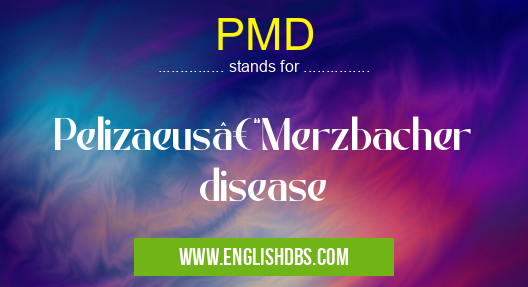What does PMD mean in THERAPY
PMD or Pelizaeus-Merzbacher disease is a rare, inherited neurological disorder characterized by abnormalities in the central nervous system. It primarily affects the myelin sheath surrounding the nerve fibers, leading to impaired nerve conduction and various neurological symptoms.

PMD meaning in Therapy in Medical
PMD mostly used in an acronym Therapy in Category Medical that means Pelizaeus–Merzbacher disease
Shorthand: PMD,
Full Form: Pelizaeus–Merzbacher disease
For more information of "Pelizaeus–Merzbacher disease", see the section below.
Causes
PMD is caused by mutations in either the PLP1 or GJC2 genes, which are responsible for producing proteins essential for myelin formation. These mutations disrupt myelin development, resulting in hypomyelination or demyelination of nerve fibers.
Symptoms
The severity of symptoms in PMD varies depending on the type of mutation and the extent of myelin damage. Common symptoms include:
- Hypotonia (decreased muscle tone)
- Nystagmus (involuntary eye movements)
- Tremor
- Ataxia (impaired coordination)
- Dysarthria (difficulty speaking)
- Spasticity (muscle stiffness)
- Cognitive impairment
Diagnosis
Diagnosis of PMD involves a combination of clinical evaluation, genetic testing, and imaging studies.
- Clinical evaluation assesses symptoms, family history, and neurological examination.
- Genetic testing analyzes the PLP1 and GJC2 genes to identify mutations.
- Imaging studies such as MRI can reveal characteristic abnormalities in the myelin of the brain and spinal cord.
Treatment
There is currently no cure for PMD, but treatment focuses on managing symptoms and improving quality of life. Treatment options may include:
- Physical therapy to improve muscle strength and coordination
- Occupational therapy to enhance daily living skills
- Speech therapy to address speech difficulties
- Medications such as muscle relaxants, antispasticity drugs, or botulinum toxin injections
Essential Questions and Answers on Pelizaeus–Merzbacher disease in "MEDICAL»THERAPY"
What is Pelizaeus-Merzbacher disease (PMD)?
Pelizaeus-Merzbacher disease (PMD) is a rare, inherited neurological disorder that affects the brain and spinal cord. It is caused by mutations in genes that are involved in the production of myelin, a fatty substance that insulates nerve cells and helps them to conduct electrical signals.
What are the symptoms of PMD?
The symptoms of PMD can vary depending on the severity of the disease. Common symptoms include:
- Difficulty with coordination and balance
- Muscle weakness
- Involuntary muscle movements
- Speech and language problems
- Intellectual disability
- Hearing loss
- Vision problems
- Epilepsy
How is PMD diagnosed?
PMD is diagnosed based on a combination of physical examination, medical history, and genetic testing. Magnetic resonance imaging (MRI) scans of the brain and spinal cord can also help to confirm the diagnosis.
How is PMD treated?
There is no cure for PMD, but treatment can help to manage the symptoms and improve quality of life. Treatment may include:
- Physical therapy
- Occupational therapy
- Speech therapy
- Special education
- Medications to control seizures and muscle spasms
- Surgery to correct spinal deformities
What is the prognosis for people with PMD?
The prognosis for people with PMD varies depending on the severity of the disease. Some people with mild PMD may live relatively normal lives, while others with more severe disease may require lifelong care.
Final Words: PMD is a complex neurological disorder that affects the myelin sheath of nerve fibers. Understanding the causes, symptoms, and treatment options is crucial for individuals and families affected by this condition. Ongoing research aims to improve treatments and ultimately find a cure for PMD.
PMD also stands for: |
|
| All stands for PMD |
